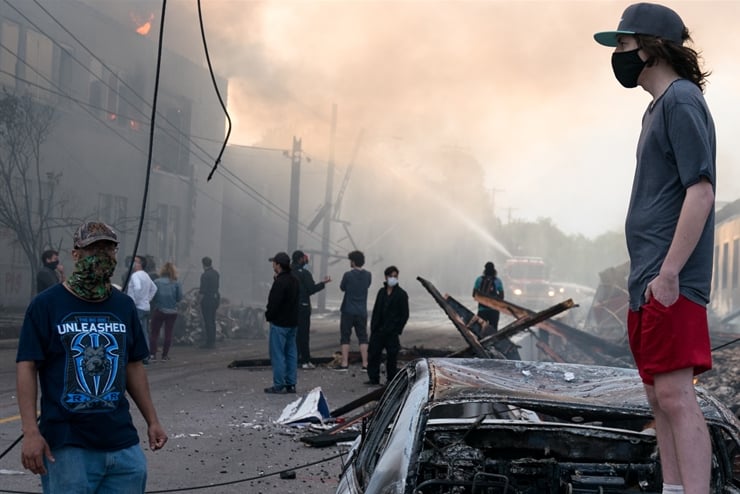As I began to contemplate the theater of the absurd that we Americans have been living through in recent days, I found the most useful place to begin was an essay by Sam Francis published in Chronicles 26 years ago, “Anarcho-Tyranny USA.” In this long, thoughtful piece, Francis contrasts the eagerness to criminalize what had been innocent behavior with a reluctance to confront genuine criminality and undoubted threats to public order. Francis wrote:
This condition, which in some of my columns I have called ‘anarcho-tyranny,’ is essentially a kind of Hegelian synthesis of what appear to be dialectical opposites, the combination of oppressive government power against the innocent and the law-abiding and, simultaneously, a grotesque paralysis of the ability or the will to use that power to carry out basic public duties such as protection of public safety.
It is hard not to read those words without thinking of Americans being arrested for taking their children to the park, going to church, or strolling on the beach; followed a few weeks later by entire police forces becoming passive spectators as rioters burned, pillaged, looted, maimed, and killed. It’s a stark contrast between the media opprobrium directed at ordinary citizens for standing too close to each other or not wearing masks in public, and the excuses offered for those who ignored the conventions of social distancing to smash shop windows and passersby.
Indeed, it is safe to say there was more media outrage at the hundreds of protestors showing up in a handful of state capitols toting guns they had a legal right to carry than over the rioters emptying stores and torching police cars, even though the armed visitors to the state houses never committed any acts of violence at all. Those protesting lockdowns that have resulted in mass unemployment were treated as bad people using bad tactics to achieve a bad end; those protesting the death of George Floyd were depicted as good people motivated by a righteous cause, even after the protests became riots.
Part of this theater of the absurd is the widespread conviction, repeated with dogmatic fervor, that America is a country indelibly stained by systemic racism. This, despite that fact that Americans elected and then reelected a black man as president, regard black athletes and entertainers as among the most popular of all Americans. Not to mention hundreds of billions spent to alleviate black poverty, both in the form of taxes and charitable contributions, as well as the implementation of affirmative action laws that discriminate in favor of blacks and against whites. Whites have accepted these measures largely without complaint and have come to enjoy the company of Americans of different races in a variety of contexts. We’re a long way from Jamestown 1619, Montgomery 1963, Cicero 1966, or any other racial flashpoint one cares to remember.
The unshakable belief in the persistence of systemic racism also ignores the fact that there is no empirical evidence showing that police are more likely to use deadly force against blacks than whites, that most if not all of the disparities in the criminal justice system can be explained by the unfortunate fact that black men commit nearly 40 percent of all violent crime and half of all homicides, that there are more policemen killed by blacks than there are blacks killed by policemen, and that, thanks to the Supreme Court’s decision in Batson v. Kentucky most of the juries convicting black defendants contain black jurors.
Striking, too, is the way that politicians condemning the riots have voiced their condemnations. Time and again, we are told, the riots are wrong because they dishonor the memory of George Floyd. I’m sorry, but honoring the memory of George Floyd is primarily a concern for those who actually knew him, not the principal reason to avoid rioting. The primary reason not to loot, riot, and burn is that, no matter how aggrieved the rioters are, it is wrong to hurt innocent people by destroying the places where they work, or gather, or live, to vent a grievance. It is wrong to tear asunder the bonds of society by assaulting the property of others or their persons. And that stopping looting, burning, and rioting is one of the chief duties of government.
The unwillingness of American politicians to condemn rioting without paying tribute to the stated grievance of the rioters shows that the “grotesque paralysis of the ability or the will to use … power to carry out basic public duties such as protection of public safety” that Francis detected in 1994 has become almost pathological. American politicians seem to be divided into roughly two camps: those who think that our country is so irredeemably racist that it deserves to die, and those who don’t want it to die but can’t quite come up with a reason why it should continue to live.
A final thought. In his 1994 essay, Francis forthrightly declared that “We have too many policemen in this country already.” He expressed many other civil libertarian sentiments not often expressed by conservatives then or even liberals today, including a concern for the rights of such “admittedly bizarre people” as, in the cases discussed by Francis, a “white separatist,” a “religious crackpot,” and a “pedophile.” I share these types of concerns, and believe that, in addition to too many policemen, we have too many laws with criminal sanctions, too many people in prison for too long, and significant problems with police brutality and prosecutorial overreach, even though such problems are hardly representative of the vast bulk of either policemen or prosecutors. However, I can’t think of a worse way of bringing people over to ideas like these than widespread rioting. These riots have to stop. And the authorities have a bounden duty to stop them, if the rioters don’t.
Image Credit: A man stands on a burned out car on Thursday morning as fires burn behind him in the Lake St area of Minneapolis, Minnesota

Leave a Reply